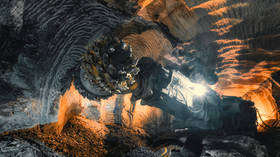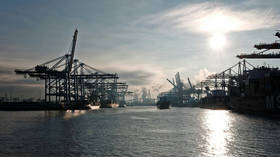Europe’s plan to ban Russian coal sends prices higher

The price of coal jumped in Europe, the US and Asia on Tuesday after the EU announced restrictions on imports of the fossil fuel from Russia, according to figures from the leading energy exchanges.
The price shot up by 14% to a three-week high, data from ICE Futures Europe show, doubling since the start of the year. The Asian benchmark also rose by 6.4% on the news. The international coal market has already been tight with Asian futures hitting an all-time high in March and coal prices in the US topping $100 a ton last week for the first time since 2008. Bloomberg has predicted that prices will rise further as European consumers step up efforts to find alternatives to Russian supplies.
The European Commission on Tuesday proposed a €4 billion ($4.4 billion) ban on coal imports from Russia as part of a wider package of punitive measures on Moscow over the conflict in Ukraine.
“The proposed sanction would be devastating to European coal imports,” Fabian Ronningen from Norwegian consultant Rystad Energy AS told Bloomberg. “Some coal can be sourced from other markets, but in general, the global coal market is very tight as well.”
Russia is the world’s third-largest exporter of thermal coal and is Europe’s top supplier. The EU depends on Russia for around 45% of its coal imports and almost 70% of its thermal coal, which is used in power and heat generation, according to Brussels-based think tank Bruegel.
The EU’s search for alternative suppliers will have to extend as far as Indonesia and Australia, the other major coal exporters, and may lead to increased competition in the seaborne or export market, and take a bite out of Asia’s consumer supplies.
Miners in Indonesia, the world’s top exporter of thermal coal, have been approached by potential buyers from some European countries, including Italy and Germany, the Indonesian Coal Mining Association told Bloomberg. Miners in Australia, the world’s second-biggest exporter, said last month that they only had limited capacity to supply Europe to help it replace Russian supplies.
“Russian coal is the closest, cheapest and in some markets like Germany the most suitable specification, in terms of heat content and sulfur” to power Europe’s power stations, according to Jake Horslen, an analyst at S&P Commodities Insights, who added that finding an alternative might pose a significant challenge.
Last year, the share of Russia’s thermal coal on the international market stood at over 16%, according to the country’s Energy Ministry. Europe bought over 50 million tons of Russian thermal coal, which was 10.3% more than the year before. Asia got 12% of its coal from Russia with China being the biggest buyer.
For more stories on economy & finance visit RT's business section













